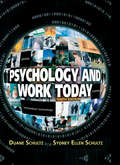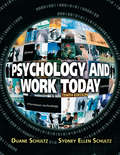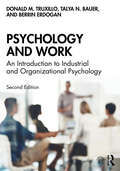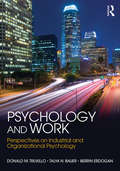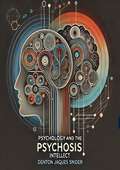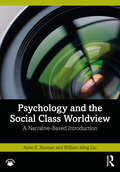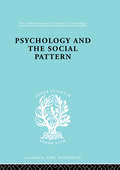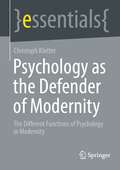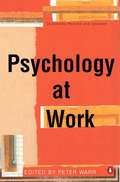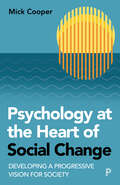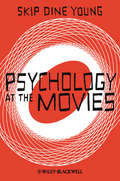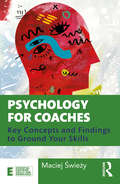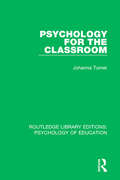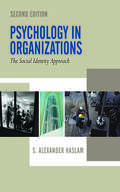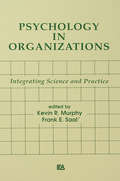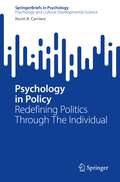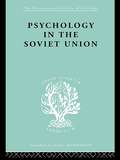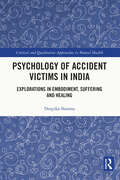- Table View
- List View
Psychology and Work Today
by Carrie A. Bulger Duane P. Schultz Sydney Ellen SchultzThis key textbook introduces students to the field of industrial and organizational psychology, explaining how industrial-organizational psychologists make work and working better. It explains how industrial-organizational psychologists help organizations hire the best people, make work safer and less stressful, and support managers and leaders to be more effective at leading others. It also describes how industrial-organizational psychologists work with organizations to embrace diversity in the workforce, design the physical work environment to best suit employees, and market their products and services to consumers.Key features of this edition include: Coverage of both the essential and traditional I-O topic areas such as job analysis, employee selection, and work motivation, as well as topic areas that are important in workplaces today such as stress and well-being, human factors, and preparing for jobs of the future. New or expanded coverage of teams in organizations, remote/hybrid work, quiet quitting, and diversity, equity, and inclusion issues, A streamlined methods chapter that focuses more on specific methods used by industrial-organizational psychologists, such as focus groups, surveys, and Gallup polls. Rich with various pedagogical tools and real-world examples, the book will be of interest to undergraduate students in introduction industrial-organizational psychology or psychology of work behaviour courses.
Psychology and Work Today, 10th Edition
by Duane P. Schultz Sydney Ellen SchultzFor undergraduate-level courses in Industrial and Organizational Psychology, Business Psychology, Personnel Psychology and Applied Psychology. Psychology and Work Today provides an invaluable foundation for anyone entering today's global business and industrial world. This informative, sophisticated, and entertaining text teaches students about the nature of work in modern society. By focusing on the practical and applied rather than the scientific ideal, the authors demonstrate how industrial-organizational psychology directly impacts our lives as job applicants, trainees, employees, managers, and consumers.
Psychology and Work Today: Pearson New International Edition CourseSmart eTextbook
by Duane Schultz Sydney Ellen SchultzFor undergraduate-level courses in Industrial and Organizational Psychology, Business Psychology, Personnel Psychology and Applied Psychology. Psychology and Work Today provides an invaluable foundation for anyone entering today's global business and industrial world. This informative, sophisticated, and entertaining text teaches students about the nature of work in modern society. By focusing on the practical and applied rather than the scientific ideal, the authors demonstrate how industrial-organizational psychology directly impacts our lives as job applicants, trainees, employees, managers, and consumers.
Psychology and Work: An Introduction to Industrial and Organizational Psychology
by Berrin Erdogan Donald M. Truxillo Talya N. BauerPsychology and Work is a new edition of the award-winning textbook written for introductory Industrial and Organizational (I-O) Psychology classes. This book makes the core topics of I-O Psychology clear, relevant, and accessible to students through its dynamic design. The real-world examples from the perspectives of employees and employers highlight how I-O Psychology is applied to today’s workplace. Psychology and Work, Second Edition covers the core areas of I-O Psychology including an overview of the field and its history. The topics covered include up-to-date research methods and statistics; job analysis and criterion measurement; performance appraisal; personnel selection; training and development; work motivation; leadership; job attitudes and emotions, occupational health psychology, safety, and stress; teams; and organizational structure, culture, and change. Throughout the text, an emphasis is placed on essential issues for today’s workplace such as diversity and inclusion, the evolving role of big data and analytics, legal issues, and the changing nature of work. Written by dedicated I-O professors with expertise in I-O Psychology and teaching this course, the book and supporting materials provide a range of high-quality pedagogical materials, including interactive features, quizzes, PowerPoint slides, numerous case studies, recommended videos, and an expanded, high-quality test bank.
Psychology and Work: Perspectives on Industrial and Organizational Psychology
by Berrin Erdogan Donald M. Truxillo Talya N. BauerPsychology and Work is a new textbook for introductory Industrial and Organizational (I/O) Psychology classes. Written by award-winning I/O professors with expertise in I/O Psychology and teaching this course, the book is organized into three main sections. It first includes an overview of the history of I/O Psychology and a chapter on research methods, subsequently covers the core principles of Industrial Psychology, and then discusses the key areas of Organizational Psychology.The book contains numerous features that highlight key concepts and their relevance to students: Learning goals direct students to the main objectives of each chapter What Does This Mean for You? and Workplace Application boxes address the implications of the material for students Case studies with accompanying questions illustrate how concepts are relevant in real-world practice Reading lists and Your Turn questions provide further discussion Keywords defined in the margins help students grasp important concepts Sections discussing global and current issues give students a sense of what’s happening in the I/O psychology field The book also has extensive online resources such as interactive features, quizzes, PowerPoint slides, and an instructor’s manual. Accompanied by a dynamic design and a strong set of pedagogical tools, Psychology and Work presents all-new content and relevant coverage for the I/O psychology course.
Psychology and the Choice of a Career (Psychology Revivals)
by F. M. EarleOriginally published in 1933, Psychology and the Choice of a Career formalizes the art of vocational guidance, which was growing in public interest at the time. It sets out the points to consider when choosing a career path and the abilities you may need. It was a valuable tool to those seeking employment for the first time in the early twentieth century. Today it can be read in its historical context.
Psychology and the Conduct of Everyday Life
by Ernst Schraube Charlotte HøjholtPsychology and the Conduct of Everyday Life moves psychological theory and research practice out of the laboratory and into the everyday world. Drawing on recent developments across the social and human sciences, it examines how people live as active subjects within the contexts of their everyday lives, using this as an analytical basis for understanding the dilemmas and contradictions people face in contemporary society. Early chapters gather the latest empirical research to explore the significance of context as a cross-disciplinary critical tool; they include a study of homeless Māori men reaffirming their cultural identity via gardening, and a look at how the dilemmas faced by children in difficult situations can provide insights into social conflict at school. Later chapters examine the interplay between everyday life around the world and contemporary global phenomena such as the rise of the debt economy, the hegemony of the labor market, and the increased reliance on digital technology in educational settings. The book concludes with a consideration of how social psychology can deepen our understanding of how we conduct our lives, and offer possibilities for collective work on the resolution of social conflict.
Psychology and the Psychosis: Intellect
by Denton Jaques Snider"Psychology and the Psychosis: Intellect" by Denton Jaques Snider is a profound and scholarly exploration of the human mind, focusing on the intricate workings of the intellect. Snider, an esteemed philosopher and psychologist, offers a comprehensive analysis of intellectual processes, delving into the nature of thought, reasoning, and understanding.In this seminal work, Snider presents a detailed examination of the intellectual dimension of the psyche, which he refers to as the "psychosis." He explores the structure and function of the intellect, considering how it interacts with other aspects of the human mind, such as emotion and will. Through meticulous research and insightful commentary, Snider sheds light on the ways in which intellectual faculties shape our perception of reality and influence our actions.The book is structured to guide readers through a nuanced understanding of intellectual development, from basic cognitive functions to complex analytical reasoning. Snider discusses key concepts such as intuition, judgment, and logic, providing a rich theoretical framework that integrates classical philosophy with modern psychological thought."Psychology and the Psychosis: Intellect" also addresses the practical implications of intellectual development, emphasizing the importance of critical thinking and reflective thought in personal growth and societal advancement. Snider's eloquent writing and rigorous analysis make this book an essential resource for students of psychology, philosophy, and anyone interested in the deeper aspects of human cognition.Throughout the book, Snider uses illustrative examples and thought experiments to engage readers and clarify complex ideas. His approach is both systematic and holistic, ensuring that readers gain a well-rounded understanding of the intellectual dimension of the psyche.Denton Jaques Snider's "Psychology and the Psychosis: Intellect" stands as a landmark work in the field of psychology, offering timeless insights into the nature of the human intellect. It remains an invaluable guide for those seeking to comprehend the profound capabilities of the mind and the role of intellectual processes in shaping our lives.
Psychology and the Social Class Worldview: A Narrative-Based Introduction
by William Ming Liu Anne E. NoonanThis unique textbook explores the complex topic of social class, explaining the many psychological nuances of class and classism in people’s lives as subjective and phenomenological experiences. Social class can be a deeply personal, complicated topic that is often frustrating and uncomfortable to discuss, and as such has often been a blind spot in teaching and academic literature. For the first time, Noonan and Liu look to address this in one comprehensive text, using a combination of first-person narratives, academic approaches to class, and psychology’s contributions to the subject. Across seven chapters, the book introduces a highly accessible theoretical model of the psychology of social class, Liu’s own Social Class Worldview Model. Using vivid autobiographical texts to bring the theoretical model to life, the authors show how our worldviews develop through interactions with our social class and economic environment and provide a unique array of methods and skill sets to help incorporate the model into teaching. Each section of the book guides the reader through core concepts in the area, from socioeconomic factors, social structures, poverty, race, racism, White privilege, and White supremacy. Featuring activity suggestions, discussion questions, and writing prompts to help apply theory to real-life narratives, this is the ideal resource for students and instructors across psychology, sociology, health economics, and social work, as well as anyone taking courses on examining social class.
Psychology and the Social Pattern (International Library of Sociology #Vol. 251)
by Julian BlackburnFirst Published in 1998. Routledge is an imprint of Taylor & Francis, an informa company.
Psychology as the Defender of Modernity: The Different Functions of Psychology in Modernity (essentials)
by Christoph KlotterPeople in Germany have an indifferent to poor relationship with our society. In fact, modernity, i.e. the last 200 years, has given the population historically unprecedented progress: democracy, human rights, social security systems, nutritive abundance. Yet this is little appreciated. This may be due to the fact that, in Diderot's sense, we have to prove ourselves permanently, that is, we live in a meritocracy that produces suffering. However, totalitarian ideologies have also emerged and been implemented in modernity, for which modernity is also responsible. This essential shows that psychology, on closer inspection, turns out to be the defender of the good parts of modernity.
Psychology at Work
by Dr Peter B WarrApplied psychology in work settings has made considerable progress in the 30 years since the original version of this book was published. This new collection of essays aims to illustrate both the empirical and practical richness of the field as wellas its theoretical development. The chapters cover psychological processes, the study of groups and workteams, and the nature of complex organizations as a whole. Reflecting recent developments in psychology as well as society generally, topics range from skill and workload, shiftwork, personnel selection, training and careers, and the effects of new technology, leadership and management, to job stress and well-being, women in employment, corporate culture and processes of organizational change.
Psychology at the Heart of Social Change: Developing a Progressive Vision for Society
by Mick CooperWe live in troubled times: climate crisis, war and authoritarian ‘populism’ are just some of the challenges we are currently facing. Never has there been such a need for a new approach to politics – nor such an opportunity for one. To create a world in which people thrive, we need to know what thriving is. Over the past century, psychotherapy – and its parent discipline, psychology – has built up a vibrant, nuanced and highly practical understanding of human wellbeing and distress. This book describes a progressive political approach that integrates insights from the psychotherapeutic and psychological domain, moving us from a politics of blame to a politics of understanding. In this vision of society – surrounded by a culture of radical acceptance – all individuals can live rich and fulfilling lives. We need those shaping our political landscape to understand psychological needs and processes more deeply to enhance our ability to work with others in a spirit of collaboration, dialogue and respect.
Psychology at the Movies
by Skip Dine YoungPsychology at the Movies explores the insights to be gained by applying various psychological lenses to popular films including cinematic depictions of human behavior, the psychology of filmmakers, and the impact of viewing movies.Uses the widest range of psychological approaches to explore movies, the people who make them, and the people who watch them Written in an accessible style with vivid examples from a diverse group of popular films, such as The Silence of the Lambs, The Wizard of Oz, Star Wars, Taxi Driver, Good Will Hunting, and A Beautiful MindBrings together psychology, film studies, mass communication, and cultural studies to provide an interdisciplinary perspectiveFeatures an extensive bibliography for further exploration of various research fields
Psychology for Coaches: Key Concepts and Findings to Ground Your Skills (Essential Coaching Skills and Knowledge)
by Maciej ŚwieżyPsychology for Coaches offers its readers a chance to ground their interpersonal skills in sound psychological theory and research. It provides a solid synthesis of current concepts and research results, translating them into hands-on recommendations and examples of tools. The book was written in response to questions asked by trainee coaches eager to make sure they are doing their best to provide a safe, professional, and valuable service. It offers clear, practical examples on how to apply presented concepts into coaching practice. It challenges popular strategies that may have unwanted side effects and offers to replace them with specific ideas on how to use coaching conversations to: support goal setting and consistent motivation encourage autonomy and responsibility assist self-reflection and manage learning increase awareness of emotions and manage them better identify and change beliefs and schemas build a healthier perception of oneself Psychology for Coaches will be essential reading for coaches in all areas, including those in training, who want an accessible, fast introduction to the most relevant areas of psychology and an overview that will guide their further learning. It will also be an inspirational guide for people aiming to use coaching skills in other professional roles.
Psychology for the Classroom (Routledge Library Editions: Psychology of Education)
by Johanna TurnerOriginally published in 1977, Psychology for the Classroom is offered as an aid to people who are learning themselves and helping other people to learn: that is, to parents, students and particularly to teachers. The activity of teaching, to be successful, requires the teacher to understand the behaviour of the learner as fully as possible. Some of the insights into human behaviour gained by psychologists may prove helpful to the teacher in complementing his or her experience and intuitive understanding, and it is with this in mind that the topics covered in this book have been selected. Section one deals with cognitive aspects, an understanding of which his essential since cognitive processes are the means by which individuals are able to make sense of their environment. Section two considers the social situation in which knowledge and understanding develop, i.e. the way in which social interaction affects learning. Section three focuses on the individual, stressing that academic achievement depends not only on hard work but is intimately related to an individual’s personal development and personality. The book will be valuable to psychology students, student teachers and teachers on in-service courses, for its coverage of relevant psychological research and the description of pertinent experiments and studies of the time. Its originality lies in the way in which it communicates the importance of teachers using psychology as a basis for forming hypotheses which they can test for themselves – not necessarily as researchers, but in a mood of personal exploration.
Psychology in Brazil: Innovative Approaches From The Psychology Of Social Development
by Silvia Helena KollerThis book presents an overview of the work of the most important Psychology researchers in Brazil, contributing to the internationalization of the discipline and fostering cross-cultural approaches in the field. Over the last two decades, Psychology research has experienced an enormous growth in Brazil, which has placed the country among the ten nations with the highest scientific output in the area. A big part of this output, however, remains inaccessible to the majority of the international community because it’s mainly published in Portuguese. This book intends to overcome this barrier, presenting a highly relevant sample of the best Psychology research produced in Brazil to those who are unable to read in Portuguese. <P><P> In each chapter, a top Brazilian researcher is invited to present a summary of his/her main contributions to the field. The result is a rich overview of the main areas in which Brazilian psychologists have concentrated their work over the last decades, such as Developmental Psychology, Community Psychology, Educational and School Psychology, Evolutionary Psychology, Health Psychology, History of Psychology and Social Psychology. <P><P>By putting together such a wide array of topics, Psychology in Brazil – Scientists Making a Difference offers a rich overview of the research in the country to psychologists, educators and social scientists in general interested in cross-cultural approaches within the Behavioral Sciences.
Psychology in Latin America: Current Status, Challenges and Perspectives
by Rubén ArdilaThis contributed volume is a real “who is who” in Latin American psychology. Edited by the most prominent psychology researcher alive in the region, the book presents a comprehensive panorama of psychology in Latin America as a science, as a profession and as a way of improving the quality of life of individuals and communities. Despite its achievements, Latin American psychology is little known by the international psychological community. In order to fill this gap, Dr. Rubén Ardila has invited the most important researchers and practitioners in the region to present an overview of psychology as both a profession and a research field in Latin America in the following areas:· Scientific research· Professional issues· Clinical and health psychology· Developmental psychology· Educational and school psychology· Organizational and work psychology· Social psychology· Community psychology· Legal and forensic psychology Psychology in Latin America – Current Status, Challenges and Perspectives seeks to place Latin American psychology on the map of international psychology, and by doing so it aims to foster cooperation between researchers, practitioners and students from the region with its peers from all over the world.
Psychology in Oceania and the Caribbean (International and Cultural Psychology)
by Grant J. Rich Neeta A. RamkumarThe Caribbean and Oceania are understudied areas from a psychological perspective, and this book is designed to fill that knowledge gap. In addition to diverse, rich cultural traditions and abundant economic opportunity for some, these regions also reflect the challenges of modernity, including crime, poverty, ethnic tensions, adaptations to climate change, and disparities in health, education, and access to care. With contributions from noted psychologists in the Caribbean and Oceania, as well as experts from around the globe, this book provides nuanced examination of significant psychological issues in nations such as Fiji, Guyana, Belize, Haiti, Jamaica, and more. Psychologists, psychiatrists, and other mental health professionals with an interest in this part of the world, will find this volume a rich resource, as will those generally interested in the relationship between culture and psychology. This book takes you on an outstanding journey of what is occurring in cultural psychology in the 21st century. It addresses the abundance of each nation through a transformational lens of current practices in psychology in Oceania and the Caribbean. I would absolutely recommend it to anyone interested in sailing the high seas connecting the present with the endless possibilities of those who dare to journey into the waters of a divine future.”- Florence Denmark, Past-President, American Psychological Association "Chock full of expert knowledge and insights, Psychology in Oceania and the Caribbean is an indispensable resource for psychologists. A must-read that will expand your understanding of life in these regions and beyond! “- Pamela A. Hays, PhD, Author of Addressing Cultural Complexities in Practice "This is a breath-taking book in its coverage of the uniquely endowed psychology worlds of Oceania and the Caribbean. Now that Dr. Rich, Dr. Ramkumar, and colleagues have produced this awesome book volume on the cultural psychology of the rim water nations, I have a palpable sense of relief from their having addressed a huge gap in cultural psychology scholarship. This volume opens hitherto undreamed of opportunities for further studies on cultural practices in psychology in Oceania and the Caribbean!”- Elias Mpofu, PhD, DE.D, CRC, MAPS, Professor of Health Sciences at the University of North Texas, Honorary Professor of Health Sciences at the University of Sydney and Executive Board member of the Australian Psychological Society’s Rehabilitation Psychology Interest Group"This book represents a vital exploration into the purpose and practice of Psychology in island nations. It is a welcome compilation of academic writings from sociocultural perspectives within Oceania and the Caribbean and serves as a landmark account of the unique forces shaping the development and evolution of Psychology in these states." - Gerard Hutchinson MD, Professor of Psychiatry, University of the West Indies, St Augustine, Trinidad and Tobago
Psychology in Organizations
by S. Alexander HaslamAlex Haslam has thoroughly revised and updated his ground-breaking original text with this new edition. While still retaining the highly readable and engaging style of the best-selling first edition, he presents extensive reviews and critiques of major topics in organizational psychology - including leadership, motivation, communication, decision making, negotiation, power, productivity and collective action - but with much more besides. Key features of this 2nd Edition: · An entirely new chapter on organizational stress which deals with highly topical issues of stress appraisal, social support, coping and burnout. · New, wider textbook format and design making the entire book much more accessible for students. · Wide range of pedagogical features included - suggestions for further reading included at the end of each chapter; comprehensive glossaries of social identity, social psychological and organizational terms.
Psychology in Organizations: integrating Science and Practice (Applied Psychology Series)
by Kevin R. Murphy Frank E. SaalThis book deals with two key questions. First, is there a firm scientific basis for the major applications of psychology in organizations? Second, does the practice of psychology in organizations contribute in any meaningful way to psychological research? This text attempts to answer these questions by describing some of the unique ways in which Industrial/Organizational (I/O) psychologists integrate science and practice in applying psychology in organizations. The editors of this volume believe that there is great potential for the effective interplay of science and practice in I/O psychology. Aware, however, that much work must still be done before a truly effective integration can be achieved and maintained, they have created a text that offers specific suggestions for improvement as well as many examples of successful integration. Psychology in Organizations explores the unique relationship between science and practice within industrial/organizational psychology. The contributors seek to answer two main questions: * Is there a firm scientific basis for the major applications of psychology in organizations? * Does the practice of psychology in organizations contribute in any meaningful way to psychological research? After an initial examination of the industrial/organizational psychologist as a scientist and practitioner, Psychology in Organizations looks at specific roles played in such issues as job performance and productivity, sexual harassment, drug abuse, and drug testing. A final chapter looks at both the past and future of the field and suggests future applications.
Psychology in Policy: Redefining Politics Through The Individual (SpringerBriefs in Psychology)
by Kevin R. CarriereThis book takes an insider perspective of the psychological issues of creating policy. Instead of considering what the products of policy are - often the case in psychological and political science work - this book examines the individual processes present in proposing and engaging with policy. The individual who engages with the policy and its meanings, the individual who resists the policy through conformity, and the individual who writes the policy for their own ideological purposes are all political actors in a psychological system. This book puts forward a cultural political psychology as the psychological study of the process of values, policy, and power dynamics. Through exploring public policy through private policy generation and individual interaction, this book pushes theoretical understandings of policy and activism in new ways. Centering on an individual’s own values in facing various policy restrictions from governments, parents, or peers, the importance of examining collective actions and also collective inactions of individuals is noted and expanded on in the text. The book provides applications of its arguments through examining the processes of unionization and actualized democracy. It seeks to point out new research avenues, including the hypogeneralization of values, one’s exclusion through activism, and everyday revolutions. This book addresses the centrality of the individual and meaning-making systems when considering where policy, politics, and psychology intersect. This book is primarily addressed to psychologists and political scientists interested in how to make change in public policy. While the experiences within the book are United States-centric, the thoughts and theories behind them are meant to be applicable to a wide variety of political systems. As there is currently very little literature on the topic, this book seeks to fill the gap and offer concise information on such an important dimension of cultural and political psychology. It is expected that the book will be of great interest for researchers in these areas, as well as for graduate-level students. In particular, this book will be relevant to researchers and students working on political psychology, public policy, development, community psychology, social representations, semiotics, activism, and social movements, to name a few.
Psychology in the Soviet Union Ils 272 (International Library of Sociology)
by Brian SimonThis is a collection of papers created from a visit by teachers and educationalists to the U.S.S.R in April 1955 by invitation of Academy of Educational Sciences of the R.S.F.S.R. The aim of this volume is to familiarize English readers with the general direction of Soviet psychology, but designed to be of interest to teachers as well as psychologists.
Psychology of Abuse
by Juan Moises de la SernaIn this eBook, we will approach one of the most important themes of our time, abuse, both physical and psychological, from a new perspective. This eBook will help us know a reality that is scarcely talked about beyond the circles of health and safety specialists, and that is extended all through life. Abuse in all its forms will affect every individual in different ways, despite the efforts made by some authorities to stop social inequalities, such as gender violence.
Psychology of Accident Victims in India: Explorations in Embodiment, Suffering and Healing (Critical and Qualitative Approaches to Mental Health Experiences among Vulnerable Groups)
by Deepika SharmaThis book traces the psychological journey of accident survivors with locomotor disability, as they move from processes of suffering to healing. It provides a holistic understanding of disability by looking into the embodied understanding of the body as shaped by the socio-political and cultural discourses around impairment. The book addresses the lack of critical qualitative research on the health and well-being of Persons with Disabilities (PWDs) by developing a nuanced understanding of their experiences. It showcases the challenges PWDs face and the process of recovery and regaining agency through interviews and personal narratives. It also highlights the steps we need to take to better understand and address the everyday needs of PWDs and make our society more inclusive. An important addition to the research on disability studies in the Global South, this book will be useful to researchers and students interested in the areas such as disability studies, critical health psychology, mental health of vulnerable populations, and qualitative research as well as professionals working in the area of health and rehabilitation. People engaged in policymaking related to disability services, rehabilitation and rights will also find this book helpful.

